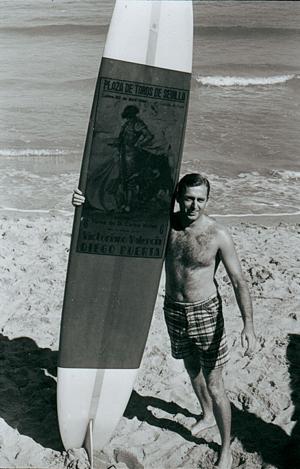Life of crime: ‘Murf the Surf’ details how television helped a con man

Filmmaker R. J. Cutler calls Jack Roland Murphy – otherwise known as “Murf the Surf” – “television’s first true crime celebrity.”
Considered the mastermind behind the 1964 jewel heist of New York’s Museum of Natural History, a convicted murderer, and a master of deception, Murphy captured the American psyche in a way Americans hadn’t seen at that time. He was good-looking, well-dressed and exuded confidence – and the public loved it.
“He was very garrulous, if garrulous means overly verbose and Trumpian in his speech patterns,” Cutler says. “He would often speak for several minutes at a time without letting up. He was not unwilling to keep me a little bit off balance in a way that’s similar to how journalists have described it.”
And, he was interested in Cutler telling his story. An Oscar nominee for “The War Room,” an Emmy winner for “American High,” Cutler has a way with stepping aside and letting the subject tell the story.
People are also reading…
“He reminded me of ‘the former guy,’” he says, alluding to Donald Trump. “I had occasion to spend some time a decade or so ago with the former guy and I recognized that quality.”
While Murphy died before Cutler could extensively record conversations with him, a producer, Ryan Gallagher, did a pre-interview that proved fruitful for the documentary.
Called “Murf the Surf” and airing on MGM+, it covers four periods in his life, using archival footage, animation, interviews and photographs to piece together the man’s persona.
Executive producer Ron Howard compares Murphy to the stars of “77 Sunset Strip,” “Hawaiian Eye” and “Route 66.” “He was learning from that – the hypnotic power of charisma – and maybe it was an easier path to sort of use this medium (to get his way),” Howard says.
Cutler says Murphy knew the power of celebrity. “I don’t want to say he’s Keith Richards before Keith Richards, but it’s darker – much darker,” he explains. “We see the darkness that it leads to and then, other questions are raised – questions about faith and redemption and all those other things.”
“Murf the Surf’s” story, he adds, enables viewers to have a deeper understanding of celebrities – and politicians – in the spotlight today.
While Cutler has had the opportunity to spend long periods of time with other subjects (a year with Billie Eilish, for example, to create “Billie Eilish: The World’s a Little Blurry”), he didn’t have the same opportunity with Murphy.
“Each film is absolutely its own riddle,” he says. An upcoming documentary about Elton John, which captures his final year of touring, enabled Cutler to look back on the first five years of the musician’s career and weave it into the last performance. The Eilish documentary reminded him of “Don’t Look Back,” one D.A. Pennebaker did on Bob Dylan.
“But with Murf the Surf, it was clear this was going to be an archival film,” he says.
Interviews from the 1960s commingle with scenes from popular culture. Voiceovers (taken from Gallagher’s interviews) and others re-created by actors help bring courtroom scenes to life.
As he was researching Murphy’s life, Cutler found the story neatly divided into four parts – the jewel thief, the murderer, the prisoner (and religious convert) and the manipulator.
Figuring into that fourth part, Cutler saw how he wanted “the narrative of his life to be told as he wished versus what the truth was.”
Although Murphy died in 2020 — before he could even see the result — he did have an effect.
“He looked like Cary Grant in ‘To Catch a Thief’ and he probably intended to dress like Cary Grant to catch up,” Cutler says.
Among the enigmatic parts of Murf’s life? The spelling of that nickname. Newspapers called him “Murph the Surf” and “Murf the Surf.” “We spell it with an ‘F’ because that’s how he spelled it,” Cutler says.
“He said, ‘I’m on the front page of every newspaper. I’m on your TV set. I sell newspapers and magazines,’” Cutler recalls. “He knew his power.
“He was very intentional. He had a goal in mind. He was subtle in his firmness. He made it clear that he knew that I had a family and he didn’t say anything else about it. He was manipulative in that way.
“My goal wasn’t to sift fact from fiction…the goal was to have his version of the story told. We try to tell give full voice to the different points of view on it and demonstrate there were many who believed his version of events and many who didn’t. Ultimately, we leave it to the viewer to see where they’ll end up. But I think there’s opportunity for great clarity.”
“Murf the Surf” begins Feb. 5 on MGM+.
For all the latest Entertainment News Click Here
For the latest news and updates, follow us on Google News.
